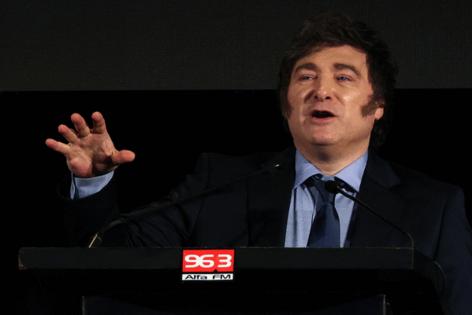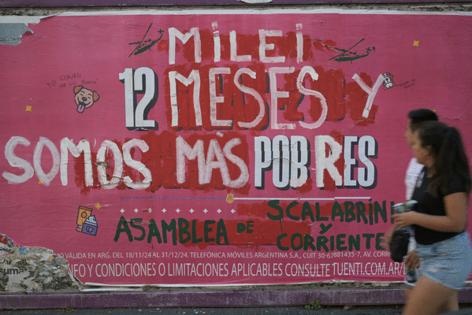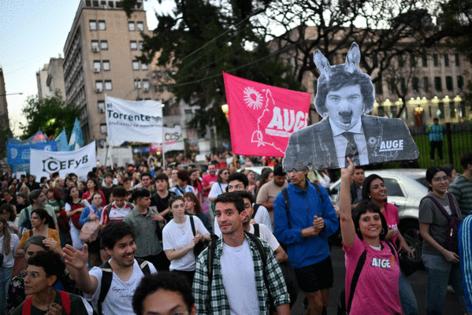College graduates are turning on Argentina's Milei after helping him win power
Published in News & Features
Patricio Aguilar just wants to go to class. The 23-year-old agriculture student voted for Javier Milei last year but now has a front-row seat as the president’s deep spending cuts reverberate through Argentina.
While Aguilar still stands behind his ballot — Milei is crushing inflation and eliminating chronic deficits, as promised — he and his peers at the University of Buenos Aires and other public colleges increasingly disapprove of the libertarian economist after largely backing his presidential bid a year ago.
Milei vilifies poorly paid faculty, accusing them of indoctrinating students with woke ideas. He also cut professor pay by more than a fifth when adjusted for inflation, to its lowest level in at least a decade. That income hit is extra painful given the president’s other policies have doubled or even tripled the cost of living.
Though he can’t stand Milei’s leftist predecessors, and doesn’t support the protests that have erupted over the cuts, Aguilar understands the anger about the president. “He went overboard with the austerity, it had to be more gradual,” Aguilar said. “Now it’s clearly getting out of hand, just by all the strikes.” The situation, he added, “lowered the positive image I had of the government.”
Tuition-free universities are a point of pride in Argentina. The country’s higher education system has produced five Nobel Prize winners and is the building block of its well-educated workforce. But it’s now underperforming in Latin America after ballooning in size over the past two decades. Students, faculty and policymakers broadly agree change is needed, but how much and how fast have hit a societal nerve.
Staff protests over pay are now such a regular occurrence that students like Aguilar have lost at least a class per week this year. It’s also not clear whether the next semester will start in March after dozens of professors at his agriculture school walked off the job.
Milei remains Argentina’s most popular politician and is riding high after a year in office, energized by his ally Donald Trump’s looming return to power in the US. The libertarian leader’s approval rating recovered last month as the economy showed signs of life and inflation hit its lowest point in nearly three years, according AtlasIntel polling conducted for Bloomberg News.
Beneath the headline numbers lies a surprising shift. With Milei deriding university staff and professors as “la casta” — his all-encompassing term for political corruption and elitism — more than 60% of Argentines with a college education or higher now say they disapprove of him, the worst of any education level.
That contrasts with last year’s election result, when Milei had 46% support among well-educated voters, narrowly beating out his Peronist opponent, Sergio Massa, according to AtlasIntel data. Milei’s approval rating among that cohort last month stood under 37%.
“The tension between Milei and universities is surely an important factor for discontent among highly educated voters,” Yuri Sanches, head of political risk at AtlasIntel, said by email. “At the same time, I believe that the disapproval ratings may also be driven by economic challenges.”
Education is just one target of the chainsaw Milei is wielding against Argentina’s public sector. He halted nearly all infrastructure spending at the start of the year, arguing that roads and bridges are a bastion of bribes. He promised to purge “parasitic” diplomats from the foreign ministry. And he called in security forces to sort baggage after a wave of strikes by the state-run airline.
Some of his drastic cuts even sparked alarm at the International Monetary Fund, where Argentina owes $44 billion. IMF staff warned Milei that “sustaining progress requires improving the quality of fiscal adjustment,” among other steps.
Milei drew the ire of academia at the start of the year when he slashed federal funding for public universities as part of his across-the-board cuts. Protests ratcheted up in October when Milei vetoed a bill Congress passed that would have raised salaries to compensate for inflation. When lawmakers tried to overturn his veto, the president persuaded enough of them to flip their votes for the lower house to fall just short of the two-thirds majority it needed to override him.
The president argues he only wants to audit public universities that he claims are a revolving door of political corruption at the administrative level. He denies that he wants to charge tuition — though his government has moved to start billing foreign students — or to close universities. And his officials point out they raised professor pay a notch above monthly inflation in October, but unions rejected the marginal bump after months of steep losses.
Argentine Education Secretary Carlos Torrendell blames scare tactics and fearmongering by university administrators and opposition politicians for Milei’s drop in approval rating among college-educated citizens this year. In an interview Tuesday, Torrendell outlined a “problem of indoctrination or strong current of woke ideology” at public universities where resources are poorly administered by politically motivated officials who maintain “an excess of professors.”
Torrendell stopped short of saying Milei would fire professors, but suggested instead positions would not be refilled once staff retired. The education secretary reiterated that the government has no plans to charge tuition nor close public universities. Nearly 600,000 students at the undergraduate level aren’t taking a single course, making it hard to properly budget, according to Torrendell.
“University leadership has chosen a confrontational dynamic due to partisan politics, ideology and a power struggle over resources,” he said. “The university system was terribly managed before where students, particularly poor students, didn’t graduate, and a lot of money was spent on a structure where people didn’t learn.”
While cuts to Argentina’s university system could threaten the caliber of its workforce as the government seeks long-term business investment, it’s clear the nation’s schools are falling behind. Only 23% of public university students graduated on time last year, down from 27% a decade ago. About 54% of enrolled pupils continue their studies after freshman year, down from 63% over the same period.
Compared to its neighbors, Argentina has more college students per 10,000 people than either Chile or Brazil, yet fewer graduates by the same metric, according to the University of Belgrano — the private institution at which Milei studied. At the same time, Peronist governments opened nearly two dozen new public universities over the past two decades, and enrollment has spiked to 2 million students from 1.3 million as a result.
To be sure, some public university students still overwhelmingly support Milei. Aspiring to be a first generation graduate, Franco Namor helps lead a student group in the president’s honor called Somos Libres, and the 21-year old wants to study Austrian economics — Milei’s preferred school of thought — after he completes his undergraduate degree. Yet even Namor saw the president become “too confrontational” with teachers.
“The professors aren’t la casta,” Namor said. “I’m not in favor of confronting so directly, stereotyping all professors and the whole university system, because there are good places.”
Professors are poised to face more pain ahead. In his 2025 budget proposal, Milei wants to spend just 0.88% of gross domestic product on education at all levels, well below the 1.45% average over the past decade. Congress often votes for annual budgets in December and the final number could change.
Whatever the figure, teacher pay — by far the largest expense in the public university system — hasn’t recovered. A tenured professor with 10 years experience at a public university was making the equivalent of $551 a month in October at commonly used exchanged rates, down from $707 right before Milei took office, according to ADIUC, the union representing professors in Cordoba province.
Milei’s cuts have hit Belen Amadeo hard. After 20 years teaching public opinion classes at the University of Buenos Aires, she makes $850 a month. It’s not enough for rent, so she teaches classes as an adjunct at private universities to supplement her income. Still, UBA remains her main employment, and the pay cut forced her to stop going out to restaurants, movies and on summer vacations with her two teenage daughters to Argentina’s countryside. She also cut back on music and sports activities for her girls after school.
Though she cast a blank ballot last year, Amadeo supports Milei’s quest to audit the university system, which even she thinks grew too much and needs reform. But the tenured professor takes offense when Milei lumps low-paid academics like her in with the corrupt political class he’s trying to stamp out. She says the president’s all-or-nothing approach is ruining decades of institutional know-how that made Argentina a global beacon of higher education.
“You need to bring in a medical surgeon, you can’t just bring in a lumberjack whose going to cut down the whole forest,” Amadeo said. “They pay me better elsewhere and I keep coming back to the University of Buenos Aires out of loyalty, so I can’t tolerate them calling me a thief.”
©2024 Bloomberg News. Visit at bloomberg.com. Distributed by Tribune Content Agency, LLC.












Comments